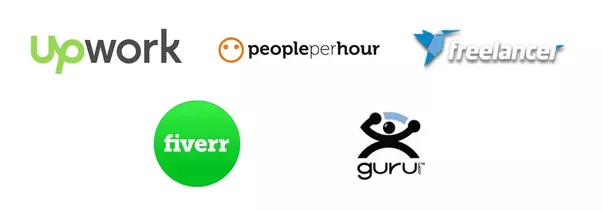
In this article, I’m going to walk you through how you can find and manage content writers. We’ll be talking from the perspective of outreach, which is our area of expertise, but most of what will be covered can be used for content writers in other areas of SEO and digital marketing.
We’ll cover where you can find writers, how you can interview and select the right writer for you, and we’ll share with you processes for managing them. There is not one way to recruit and manage content writers, but we’ll share with you our extensive experience and what helps us reduce time and increase productivity.
If you’re running your own outreach you might find some little nuggets that will help you tweak your own processes to make them more effective. If you’re looking at starting to scale your outreach, you have everything you need in this article to get it set up and running smoothly, in terms of content creation, without falling into some of the traps most of us have stumbled in, at one point or another.
How to find writers
In this article, we’re going to be focusing on recruiting and managing your own team of content writers. We’ll also take a quick peek at some companies that offer content services, to give you the full range of options.
The first part of the process is to have a clear idea of what to expect from your writer. Recruiting can be a black hole in terms of time if you allow it to be.
The key is preparation.

Job description: Take the time to write a job description. Have a clear idea what level of experience you require, for example, whether you need experience of writing for specific niches (if relevant) or not. Think about how many articles you are expecting them to write and what turn around time you need.
BONUS: FREE Guide on How to Acquire High-Quality Links
Experience has shown, the more “demanding” or specific you can be when recruiting, the better results you’ll get. You’ll weed out potential applicants who don’t meet your requirements. They will either see they don’t meet your expectations or they will be too lazy to read the description and click another job post. Either way, you’ll spend more time looking at applications from writers who are fit for purpose.
Where to find writers
There are freelancer platforms that are a good place to start. You’ll know most of them. Upwork, Freelancer and PeoplePerHour.

The benefits of freelancer platforms:
- You get to create your own opportunity, being as specific as possible to attract the right kind of content writers.
- It’s also a good use of time. One advert posted and you’ll get a range of applicants to sift through.
- You get social proof. Writers will have a reputation on the platform that can be a trust signal or a potential warning sign.
There are some negatives too:
- You’ll get a lot of rubbish. Some applicants won’t be suitable but rather than reading through the description, they’ll apply a “numbers game” approach and have a standard reply to every position and hope, that with enough applications they’ll pick up work. Problem is, they are wasting your time in the process.
- A limited number of good quality writers. These freelancer sites take a cut of the fee the freelancer receives. So naturally, well-established writers will have a portfolio of clients and will prefer to pick up clients other ways to get the full fee.
Recruiting tips
If you decide to explore freelancer platforms here are some tips to optimize your recruiting.

Asking for examples: you really need to see some examples of outreach they’ve done. For a start, you’ll have another site to contact because you know they take guest posts.
But more importantly, you’ll see that they have had their content accepted and published by a variety of blog owners. You’ll also get to see their writing style and the quality of site that accepted their content.
Additional questions: if you have the option, create a couple of additional questions that require a decent paragraph to answer properly.
This has two benefits. First, it will filter out applicants who are trying to apply for every job, regardless of their suitability. Saves you wasting your time having to find that out. Second, you will get an opportunity to assess their writing in terms of accuracy and attention to detail.
It’s always a good idea to ask for examples of their outreach work, however, it’s likely the work will have been proofed/edited by the site owner. It won’t give you an idea of how accurately they write. Important if you plan to proof the work yourself, or have a VA do it. Getting an idea of how accurate the applicant writes will be a benefit.
Rate your English: When recruiting non-English writers, a good question to ask is to get the applicants to rate their English from 1 to 10. A good “trick” is to add the caveat (7+ will be required for this job). This throwaway line invites the applicant to give a more honest answer. You’ll probably end up taking those who rated their English as a 10 but it saves time having to weed those out that don’t have such good English.
Alternative freelancer sites
Some of the sites mentioned above represent sites that allow you to post your requirements and have potential writers register their interest. They vary in quality and expertise. For example, Upwork is considered the best but if you were looking for writers from the UK, you might find a better range on People Per Hour which tends to attract more British based freelancers.
However, there are other sites that present the freelancers and you get to pick who seems to best fit. Sites like Legit, created specifically for the digital marketing community.

A superb resource is the Facebook group Cult Of Copy Job Board. You’ll find great quality writers here. There are a lot of copywriters, so it’s a good place to find sales copywriters, or niche specific writers. Which is especially important if you’re looking to place links on authority sites.
Content Services
It would be a wasted opportunity not to talk about some of the businesses that offer content creation as a service.

As with most things in the SEO community, you’ll find a massive range of quality and pricing for the same service. Here are some of our favorites, and those that have solid reputations. It’s not a definitive list, there are others out there who provide a good quality service, but it’s a good starting point.
Run by Jonathan Kiekbusch, SEO butler (formerly known as PBN Butler) has carved out a solid reputation over the years. They have good writers and good processes in place. You get to pick the quality of content you need, with each level priced accordingly. Use our coupon DIGGITY10 for a 10% discount.
Again from another member of the SEO community, Joe Graisbery, has a reputation for knowing his stuff and being a decent guy. Joe can be found on facebook offering plenty of value. It’s also pretty tough to find a negative word said about his content service.
On the more expensive side of the street but there are a lot of people who would say the little extra you pay is well worth it. They have been part of the content creation industry from the start and have huge clients and a lot of positive feedback.
Very similar to Textbroker, you can pay a little more but you get the extra quality. They also offer a lot of different types of content, everything from blog posts to press releases. So a good resource. You get your own project manager which helps with the whole process.
Note: We tend to place trust in services that have a public persona and contribute to the SEO community. They’ve aligned their personal reputations on content and you get extra attention to customer service and quality control.
We also tend to favor services from vendors with backgrounds in SEO because it helps to understand what’s SEOs require from their content. Other than that, we respect longevity. If you’ve been in the industry a while and kept a reputation for providing quality it has to count for something.
Recruiting outside of the freelancer community
Like most other things (it seems), Craigslist is a good place to find writers. You’ll get students and local writers. OK, it takes a little more work but on the plus side, if you pick up a local student who needs the work it’s a win-win. They may not be fully aware of the going rates for different quality of writers and you can take advantage of that.
Top tip:
Not many people know about this potential group. A good place to find writers is with English teachers. Not English teachers based in English speaking countries but rather TEFL teachers. (Teaching English As A Foreign Language).

These are native English speakers, who have a strong understanding of grammar (they teach it), have a natural affinity for the language (they teach it), and they generally tend to teach for 20-25 hours a week, so they have some free time.
BONUS: FREE Guide on How to Acquire High-Quality Links
Life as a teacher pays pretty well for local conditions, but usually not great. Most teachers end up taking on private students to earn some extra cash and welcome a change so might be interested in writing.
They tend to be based in countries where the cost of living is lower, often countries like China, South Korea and Thailand, they will charge competitive prices in dollars and pounds.
Fun Fact: The sales staff of one of my businesses are entirely made up of Ex-English teachers with perfect English and college degrees.
Interviewing and selection
There are some people who take the time to speak to potential writers. They feel that there is value in that. I would say that it’s definitely something to consider, a voice interview over Skype for example. Especially if you are talking about high value “expert” content.
However, I would suggest the best way to interview a writer is to give them a writing task and use that as the interview. A real outreach project. Worse case scenario, you’ll need to re-write it yourself.
Give them your SOPs, your expectations and a realistic deadline, similar to what you’d expect from them if they were your writer. Then gauge both the quality of content and how well organized they are. The last thing you want to be doing is chasing your writers, your time can be better spent elsewhere in your business. So this is a good test.
SOPs (Standard Operating Procedures)

In terms of continuity, the most important thing you can do is create your SOPs. (Standard Operating Procedure) for any given task, especially content writing.
In most cases, you will want to scale your business which includes scaling your outreach. Having a set of processes in place to ensure every writer is on the right page helps when scaling. It also helps with training.
Most writers work for a variety of clients and each client has different demands and different processes. It’s not easy for the writer to remember what each client wants from them, and anyway, why would you leave it up to the quality of the writer’s memory?
Having a working document the writer can use each time to remind themselves how you want your content is going to really be of help to them. Naturally, they want to deliver good quality content so it works for both sides.
Important things to include:
- Timelines. Have very specific timelines for your content. It helps when scaling but it also helps the writer manage their own workload when they have clear deadlines to work to.
- Formatting. Most clients get their editor or another member of the team to format content from the writer. Which is fine, but it’s a waste of resource. Often, it’s very easy for the writer to format as they’re writing, including headers, font, images etc.
- Process. You should have an idea how you would like your writer to research and write the subject, how they should deliver the work etc.
- Editing/proofing. Every writer will have their own way of proofing the work. You should have tools and a process you require them to use, again to standardize across different writers.
- Examples. With every part of your process, if you can provide an example of exactly what you mean, it will ensure the point is understood and provide a point of reference if the writer is not sure. Additionally, it helps when using the SOPs as a training resource.
Managing your writers
Having the right processes in place is going to make your life infinitely easier. It’s also going to save you money and allow you to scale as your business grows.

There’s not one “right” way to manage your writers, but we have a system that we’ve fine-tuned that we would be happy to share. It’s worked well and having spoken to other SEOs, it’s similar in some ways to how they manage their content creators. There’s plenty of overlap.
As with most things in the SEO world, it’s based on spreadsheets. We use spreadsheets for our entire outreach process, together with our own custom built platform. But for this article, we’ll focus on the content fulfillment process.
Access a done-for-you spreadsheet by clicking here
You need to create the following headings
- Date Of Order. This is the date you offer the project to the writer.
- Guest Post Title. The title of the guest post agreed with the blog/website. If no actual title has been agreed then add the general idea/concept.
- Target Site URL. Add the URL of the target website.
- Guest Post Guidelines. If the site has a page that offers guest post guidelines, that might help the writer, add it here.
- Anchor text. Decide on the anchor text required for this specific link and add it here.
- Additional Info. If important info came up during communications with the blog owner, that the writer needs to be aware of, add it here.
- Writer. This is where the writer add their name when they accept the particular post project.
- Article URL. Have the writer create the content using Google Docs and add the URL here when finished.
- Word Count. Add total wordage for the article here. It might be necessary to meet site guidelines or you could be paying writers by the word so it’s useful data.
- Date First draft finished. The writer fills this in when they’ve written the article and added it to the spreadsheet.
- Date submitted. This is the date the article was sent to the target site.
- Status. You’ll fill in this column when the article is reviewed and accepted on the site or requires editing. You’ll update it when the site agrees to the content.
- Paid. why not keep a note of which content you’ve paid out on and which you haven’t.
What else you’ll need
You’ll need to create a group chat. A lot of people use Slack, it’s probably the most effective tool because you can switch between group chat and individual chat easily. It’s also free. Others will rely on Skype which does a decent job. We would recommend against it for productivity reasons. It’s so easy to get sidetracked when Skype is on.
The process
The goal is to have a central point to collect and store information on all the different guest posts in the various stages of being completed and placed. (from the stage where the site owner has agreed to the guest post to paying the writer and having the link go live).
BONUS: FREE Guide on How to Acquire High-Quality Links
Ideally, you want a bank of writers that you have already accepted, every time you have a new guest post, you make it available to all writers, and it’s “first come, first serve”. You use the chat group to offer the projects and give feedback to specific writers and the spreadsheet to track each guest post from offer to placement and payment.
Next, I will walk you through the process step by step, but before we look at that, it’s important to understand how this all connects.

One of the main reasons we suggest using a project as a “test” (for new writers) is because once they’ve passed the test, we want to give them access to the chat group and let them assign themselves guest posts on a first come, first serve basis.
It’s important we don’t end up holding the hand of each writer. And really, we don’t want to go through the whole recruitment process for every guest post we need content for. This system allows us to be constantly recruiting writers so we are able to have a bank of writers fighting over each other to get gigs.
Additionally, this process requires a great SOP. It needs to explain the process to them, step by step. Not just the content and formatting requirements but exactly how they acquire projects, how they update the spreadsheets, receive feedback and get paid.
It all fits together.
Let me finish by breaking down the process step-by-step, from getting a guest post “order” to paying the writer.
Step-by-step
Step 1 – Add the details of the new article on the spreadsheet including;
- Date Of Order
- Guest Post Title
- Target Site URL
- Guest Post Guidelines
- Anchor text
- Additional Info

Step 2 – Go to your group chat and add the new order to the chat, including the row number and Guest Post Title.
Step 3 – The first writer to react to the new order offer will add their name to the spreadsheet, next to the relevant guest post. This means the post is allocated to them. You will add Allocated to the status column.
Step 4 – The writer finishes the article, using the formatting and to the deadlines outlined in the SOPs.
Step 5 – Once they’ve finished, and proofed the content, they share the document by adding the URL to the Article URL column and also filling in the Word Count column (They need to work in Google Docs). They also change the status to Review.
Step 6 – You or your editor reviews the content, if you require any changes, you communicate those changes with the writer through your designated chat system. The status stays at review until all changes are made and accepted. Then the status gets changed to Approved.
Step 7 – Your team sends the content to the site owner/manager and wait for their feedback or the post to go live. The status now gets changed to Submitted.
Step 8 – With the content sent to the blog owner, you can now pay the writer. Once you’ve paid them, fill in the spreadsheet to read “Paid” by adding a date that payment was made.
Step 9 – When the article goes live, you mark it as Live on the spreadsheet to finish the process.
Here is a full example of the process completed (click here).
The key is to keep the status column up-to-date so you can see at what stage of the process each post is at, at a glance.

Takeaways
Process is important when it comes to content creation for outreach. The goal is to make your process as streamlined as possible to free up time and resources. Managing writers has a habit of chewing into your time if not managed carefully.
In terms of finding writers, you can use services for content. If you were to calculate your time and set yourself an hourly rate, you might find they are more cost effective for you than setting up your own team. It’s worth the calculation to check.
If you’ve chosen to create and manage your own team, have a process for your recruitment. Have a set job description, have additional information requests, whatever you need to do to weed out time wasters and spend your time looking at writers that fit your requirements.

The best way to really assess a writer is to use them. Give them a real task (paid). Also, give them the SOPs to work with to gauge how well they follow instructions and deliver. The goal is to minimize the time you need to spend chasing them.
When creating your SOPs you really want to be as clear and detailed as possible. Your writers will thank you too! Include formatting, deadlines, and how your system works and what’s expected of them.
Now you create a spreadsheet with the headers I’ve outlined (access it here) and you share it with your writers. You also get them to join a group on a chat system. Either Slack or Skype works well, both are free.
When you get a new guest post, you add it to the spreadsheet and let the writers know in the group chat you’ve set up. It’s first come, first serve. They mark their name next to the post and follow the process through, updating the status all the way until it goes live.
It works because it’s simple, it’s doesn’t have many moving parts. It’s also easy to scale and manage which is the important component. The goal is to get the writers to do most of the work and for the process to manage the writers and allow you to see what’s happening, to get a snapshot but be hands off.
Your time is your biggest asset, this system helps you optimize it when looking to manage outreach content creation.
